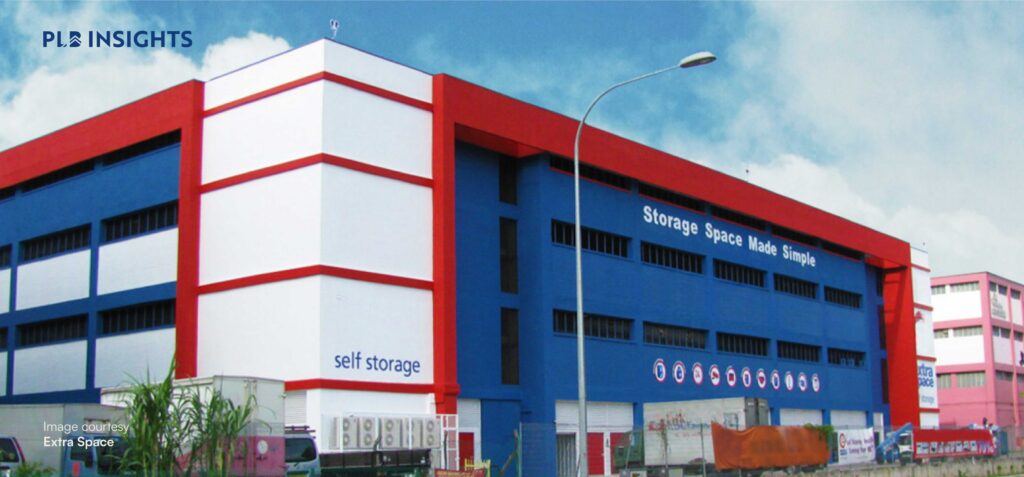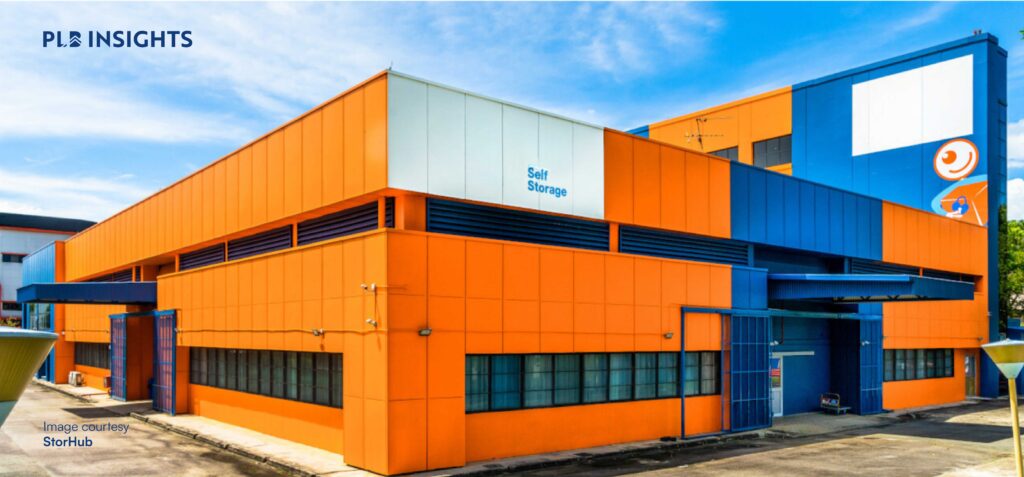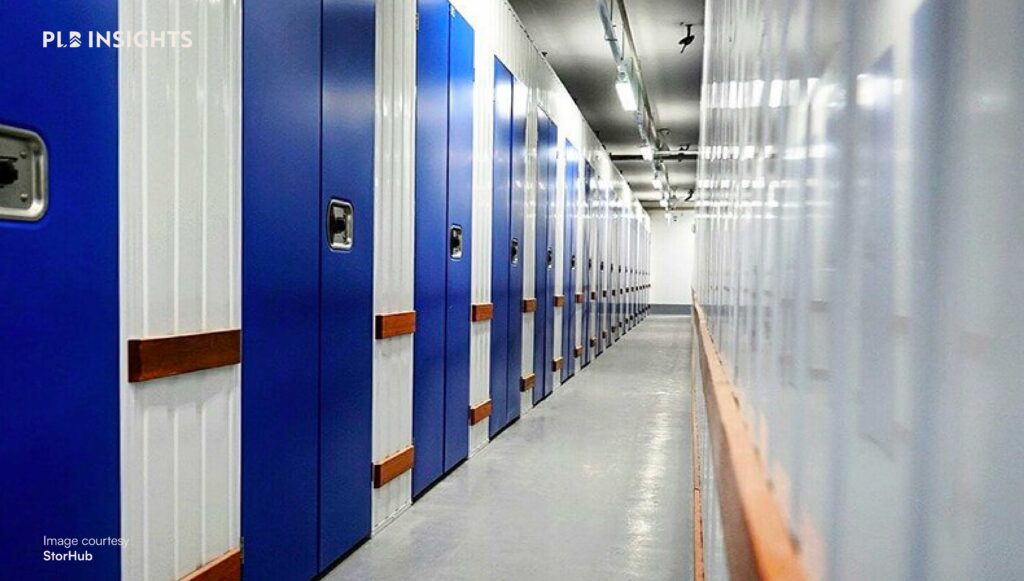
As lifestyles evolve and living spaces shrink in Singapore, individuals are turning to self-storage facilities to store their belongings. Self-storage facilities offer a unique combination of space, convenience, security and an opportunity to optimise space for individuals and businesses.
In this article, we explore this rising rental trend in Singapore and uncover the reason behind the surge in the demand for self-storage facilities by both individuals and businesses. Moreover, we go over the different uses of these facilities and the growth potential of this industry in the commercial real estate market.
Join us as we delve into the emerging trend of self-storage and its impact on transforming the way Singaporeans address their storage needs in a fast-paced urban lifestyle.
What are they?

Self-storage facilities are spaces where businesses and individuals can rent storage units on a short-term or long-term basis to store their personal belongings or inventory. These facilities in Singapore are considered a commercial property type because they operate as businesses that offer storage space, along with additional services, to different customers. Some well-known self-storage companies in Singapore include Lock+Store, StorHub, Mandarin, and Work+Store with various locations across the city.
Self-storage facilities come with various features and offer a range of services that can ensure the safety and maintenance of customers’ items, which we will discuss later in the article.
Increased Demand for Self-Storage Spaces
Work+Store, a self-storage operator in Singapore, stated that demand for its facilities was up by 20% in the last few years, according to an article by CNA. What further highlights the increase in demand is the growth of self-storage facilities in Singapore, which have gone from under 10 operators five years ago, to more than 30 operators with locations throughout the country.
The increase in demand for self-storage facilities in Singapore over the last couple of years can be attributed to several different factors. Let’s go over some of these.
Post-Covid Delays
The construction sector was one of the many sectors that was hit by the pandemic. This resulted in supply chain disruptions and manpower shortages, causing delays in the construction of the Housing Development Board’s (HDB) Build-to-Order (BTO) projects.
According to a Straits Times article in 2021, 43,000 households were expected to face delays in the construction of their HDB flats. Similarly, homeowners that were working on home renovation projects also faced delays due to disruptions caused by the pandemic.
These construction delays and renovation projects led to an increase in the use of self-storage spaces as couples and families waiting for work on their homes to be completed opted to store some of their belongings and furniture in a secure place.
Space Constraints
Space constraints are a major factor in the demand for self-storage units in Singapore, and started becoming more apparent over the last few years as a result of lockdowns. As working from home slowly became the norm, individuals utilised self-storage units to declutter their homes for more space and created a home office with all the necessary equipment. Additionally, a large percentage of Singaporeans live in non-landed residential areas, where space is not as in abundance as that offered in landed homes.
Moreover, due to rising rental prices over the last three years, rather than upsizing, or even downsizing, individuals are looking to store additional belongings in self-storage units to declutter and optimise their living spaces.
Increase in International Travel
As international borders reopened, more and more people started planning trips overseas. Demand for storage space surged as a result as individuals needed additional space to store any winter clothing and luggage that is not needed throughout the year in Singapore.
Storage for E-Commerce Businesses
Small business owners with a growing customer base turned to self-storage units to store inventory. They used these spaces as a warehouse to store their products rather than renting a physical shopfront. This has become a much more affordable option for small businesses as the rent for the shopfront can be five times as high as reserving a self-storage unit. Moreover, having a separate place to store inventory can allow business owners to create some work-life boundaries.

Features and Services

As we can see, self-storage facilities can be used for a variety of reasons, both personal and commercial. The use of self-storage units surged and may continue to stay in demand due to the many features and services they offer to fulfil the needs of different customers in Singapore.
Variety of Storage Unit Sizes
Storage spaces are not all one size across facilities. There are spaces as small as lockers, as well as spaces that are as large as a bedroom or living room. The storage spaces can range anywhere from 10 sq ft to 200 sq ft, and even larger for businesses. Depending on your needs and the type of items you plan on storing, you can choose the ideal storage space size for your belongings.
Security Systems & 24/7 Accessibility
One of the most basic, yet essential, features that most self-storage facilities offer is 24/7 security with CCTV surveillance and security checks by staff during business hours. Take note that different companies and operators may have different security protocols such as pin code access, digital locks, and facial recognition.
Another feature self-storage facilities offer customers is accessibility to storage units and their belongings at all times, including weekends and nights.
Additional Features and Services
In addition to the general features offered in self-storage facilities, there are extra services you may find, depending on which company you decide to rent from.
These extra services can include moving and packing supplies and robots that can transfer your items to storage spaces safely. Some self-storage facilities may also offer a valet or delivery service to pick up and drop off your belongings. Customers can also rent a storage space that is air-conditioned or climate-controlled to ensure that the temperature within the space is optimal for keeping materials such as leather and paper in good condition while in storage.
Renting A Self-Storage Unit
Before renting a storage unit, it is essential that you identify what you need to store and the type of space you will need for your belongings, along with the amount of time you need to store them for. Once you have done that, you can start looking for self-storage units close to you, factoring in things such as location and pricing. After this, you should be ready to reserve a unit in your chosen location and facility, make payments and store your belongings for as long as you need to.
Take note that this is a generalised guide that goes over the basics of renting a unit. The details, rates, and conditions of the rental conditions can vary from company to company based on the type of space you choose.
Growth Potential in Commercial Real Estate
In addition to the increased consumer demand for self-storage facilities in Singapore, there are several factors we should take into consideration when looking at the growth potential of this type of property in commercial real estate.
Attractiveness of Investment
According to a study conducted by Jones Lang Lasalle (JLL), the surge in demand for self-storage facilities since the pandemic has caught the eyes of real estate investors in this sector.
Certain contributors, such as remote work and a rise in e-commerce businesses, that initially caused the increase in demand not only in Singapore but across the Asia Pacific region is predicted to continue. In fact, data from the study highlights how the e-commerce market is expected to grow over the next five years by 11%, making it a key driver of demand as retailers turn to self-storage facilities for their inventory.
In addition to the expected growth of the e-commerce market, a large portion of demand in this sector consists of individual consumers that rent self-storage spaces for personal use as we discussed earlier in the article.
These factors can make the self-storage industry an attractive choice for investment.
Low Operating Costs & Consistent Demand
Another factor that may contribute to the growth potential of self-storage firms and make this a good choice for investors is the low operating costs of self-storage facilities. Unless you have storage spaces that come with climate controlled facilities, 24/7 security guards, and other technological investments that enhance services, there are not many operating costs aside from basic utilities and rent.
The operational costs of self-storage spaces are relatively lower than those of residential properties and other office, retail or industrial properties. However, with these additional services, there is potential for higher revenues.
Along with lower operating costs, there is a consistent demand for self-storage units throughout the year and through changing market conditions. This is because of the wide range of customers that operators cater to. From needing extra space to store furniture while renovating a home, to needing a large storage space to keep inventory for a small business, there is demand for self-storage facilities consistently.
Diversification
Due to the nature of self-storage facilities, each unit or space can be very differentiated. Apart from the varying sizes of each space, operators can offer customers complementary services and unique features that set them apart from competitors. This results in a diversified facility that caters to a wide range of customers, both individuals and businesses.
Although there are various factors that indicate the growth potential of this sector for commercial real estate investors, there are challenges that investors may have to work through.
Competition & Market Saturation
With Singapore being a relatively small country and already having several different operators that lead the industry with the innovative services and features they offer across various locations, new companies may have to offer competitive prices, unique features that enhance convenience, or both to set them apart. This means that the competition for new entrants is high.
As the transformation of the self-storage industry over the last few years has caught the attention of global investors with private equity funds, the price of assets has further increased. This can be a factor that may potentially drive out operators that cannot outcompete other players within the industry.
Along with high competition, there may be a possibility of the self-storage industry in Singapore becoming saturated due to the increase in investments within the sector. With an oversupply of similar facilities throughout Singapore, customers will turn to the leaders of the industry that offer the most competitive services for the lowest price. This could lead to lower occupancy rates as well as decreased profitability for operators that fail to outcompete companies that offer better prices, services and features.
Rising Price of Real Estate
Although self-storage facilities fall in the category of commercial real estate, they are built on industrial properties. Companies such as Lock+Store lease some of their locations in Singapore, and mentioned in a Business Times article earlier this year that they faced a significant increase in rental rates. Furthermore, self-storage operators are also facing higher financing costs with a rise in interest rates on the purchase of their buildings.
This could make the price of property for these facilities a hurdle that self-storage operators may have to face.
Closing Thoughts
The rise of self-storage facilities in Singapore over the last few years highlights the emerging trend that addresses the consistent and growing demand for storage solutions. With space constraints, changes in consumer trends, and delays caused by the pandemic, self-storage facilities offer an affordable and convenient way for customers to store extra belongings.
As commercial real estate developers recognize the potential for growth within this industry, the growth of self-storage facilities is set to continue and meet the evolving needs of individuals and businesses.
If you want to stay up-to-date with insights on what is trending in the real estate landscape of Singapore, check out more of our articles and content here, and if you have any questions about your real estate journey, feel free to contact us here.
Until then, see you in the next one!







